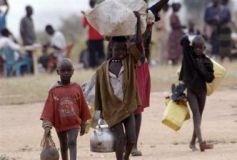Children; the missing face of Sudan’s 50 years of independence
By Swangin Bismarck
Jan 9, 2006 (RUMBEK) — Rumbek-Southern Sudan has taken a torturous journey for half a century marred by civil wars which placed its children in a cocktail of suffering that puts its future at stake.
 As Sudan celebrated 50 years of independence on Sunday January 1, Southern Sudan’s children remained indifferent; nostalgic because for many of them live to this day has been by chance.
As Sudan celebrated 50 years of independence on Sunday January 1, Southern Sudan’s children remained indifferent; nostalgic because for many of them live to this day has been by chance.
Southern Sudan’s children have born the brand of deaths due to curable diseases for 50 years, compounded by severe famine and high malnutrition rates.
Sudan’s turbulent nature has created illiteracy figures and malnutrition rates that compare disturbingly in the region and the world in general.
A peace deal signed early this year to end the 22 year conflict that pitted the South against the Khartoum regime is the new window of hope for southern Sudan, a region whose children have been a forgotten face and those who survive, live in the face of multiple threats.
The war left Southern Sudan’s social services in tatters. This has negatively impacted heavily on the regions’ children who have never had an opportunity to grow in a decent environment like children elsewhere.
Sudan’s 50 years of independence means little for the children of Southern Sudan who have been abused as the wars raged on and whose vulnerability touches one at the soul in an environment with limited access to education, health and the absence of a child friendly environment.
UNICEF in an effort to salvage the future of Southern Sudan is providing access to education for thousands of children, who have for ages been hidden from the public eye.
UNICEF is slowly but surely breaking the vicious circle that has held children at bondage for generations.
Massive provision of safe water has enabled significant numbers of children go to school as they no longer spend much time in search of water like before and a vigorous child protection effort is day by day increasingly getting children out of abuses such as the burden of being laden with much of the domestic work.
But for a vast region like southern Sudan, with villages unnamed on any map, efforts to holistically save its children still have a long way to go
Today, one year after the signature of Sudan’s landmark peace agreement, Southern Sudan’s children still live in dire conditions; poor health facilities, high malnutrition rates, abuse and limited access to school.
Policy makers need to place children at the centre of policy making, if this war ravaged region is to realize its dream of prosperity and dignity for all.
Absence of a healthy young generation will certainly jeopardize any effort geared towards sustainable development.
For southern Sudan, already less by a generation lost to war, provision of adequate social services to its most vulnerable populace (women and children) is the only way forward for its future.
(ST)
